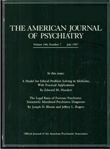Is there a relationship between eating disorder and affective disorder? New evidence from sleep recordings
Abstract
There is evidence that patients with anorexia nervosa (particularly those who also have bulimia) and patients with affective disorder share many features. The authors present sleep polygraph data from 20 young women with anorexia nervosa (17 also bulimic) and 10 age-matched normal women. Their urinary free cortisol levels were determined, and the subjects with eating disorders were also rated for depression. The findings suggest the existence of a subgroup of patients who show sleep abnormalities, in addition to clinical and possibly endocrine abnormalities, that indicate concurrent affective disorder. The authors present several models that could account for this relationship.
Access content
To read the fulltext, please use one of the options below to sign in or purchase access.- Personal login
- Institutional Login
- Sign in via OpenAthens
- Register for access
-
Please login/register if you wish to pair your device and check access availability.
Not a subscriber?
PsychiatryOnline subscription options offer access to the DSM-5 library, books, journals, CME, and patient resources. This all-in-one virtual library provides psychiatrists and mental health professionals with key resources for diagnosis, treatment, research, and professional development.
Need more help? PsychiatryOnline Customer Service may be reached by emailing [email protected] or by calling 800-368-5777 (in the U.S.) or 703-907-7322 (outside the U.S.).



